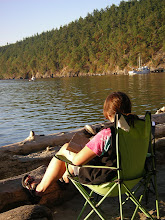Today, I'm preparing my lesson plans, gathering books and samples of my journals through the years and various litmags, organizing poems and thinking about the elements of poetry that come together to create images, linguistic magic and meaning.
And tomorrow afternoon, I will meet the 4th graders at a local elementary school -- leading them in poetry workshops, each class one hour a week, until sometime in May near the end of the school year.
As I was going through my files, here's something that a very wise and important teacher and poet, Tom Brush, gave me long ago when I was in his poetry workshop class in high school.
Poetry Workshop - with Mr. Brush
SOME THINGS THAT WILL HELP
February is cold stones and ice.
February is wind. February is
Brass tacks.
1. Calling things by exact names helps cut hints of sentimentality.
2. Don't be vague. Be subtle instead.
3. A poet: someone who is never satisfied with saying one thing at a time.
4. Poetry: a sense of the doubleness of life.
5. Poetry is an act of mischief.
6. Show the future with poems, indulge every poetic fancy...anything that provides release...
7. Are the words predictable? (Better they aren't.)
8. Long line: Sings, has more speed and grace. May also be used for long rushes of angry sentences where words tumble over each other. Lyric.
9. Be content with as many selves as you can as a poet. Never restrain yourself to one voice.
10. Short lines: Slows the reader down, more weight to the words, more tension to end stops. Short line is terse, breathless. Makes the reader pay more attention to individual words. Double check line lengths as suitable.
11. Poem: one more triumph over chaos.
12. The basis of poetry is sensation.
13. You need spins, the shifts, the rants, the howls.
14. Faith. Writing is an act of faith in the creative capacity of all of us. (I want...I want...)
15. Fill in the blanks, open other end, take a chance, use it all!
16. Write about what you know about. Your place on the back lawn, your father's face, the car that was left by the side of the road, rain against the windows you look out, the party that turned out badly, limes and signs, dos and don'ts.
17. Write about what you don't know about. What you didn't know you knew.
Poetry is warmth and sunlight.
Poetry is kind. Poetry is
All right.
***
Here's a new blog I found today by poet Joseph Duemer, who went to the same high school as me, although years apart. He, too, adores Tom Brush.
Monday, February 18, 2008
Subscribe to:
Post Comments (Atom)

2 comments:
Hey, when were you at KM? And if you're a Husky, did you also go to the UW?
Your work with 4th graders seems to me like it will be much harder in some ways than my work with high school students, though if you can get them into a playful mode they will probably have a ball. You have a bunch of good exercises -- and it is always good to have twice as many as you think you'll need!
Amy! We need to exchange lesson plans. I have transitioned to nonfiction with my fourth graders. . . but I have a ton of poetry lesson plans if you want them. Let me know. Also, I love your blog. :) -Maya
Post a Comment